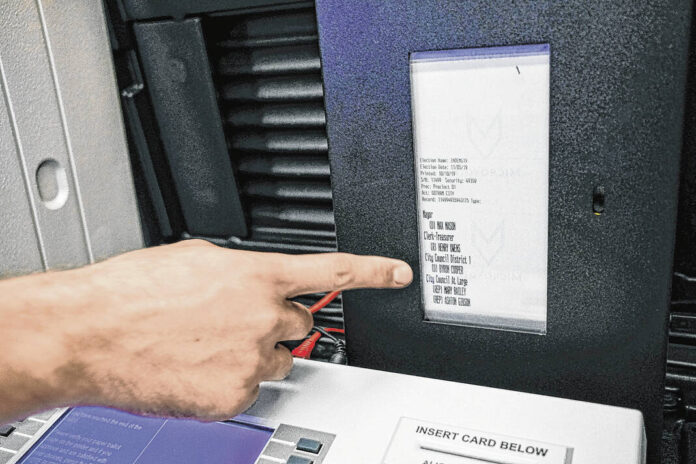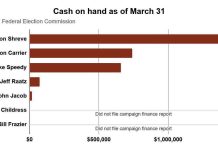
Mike Wolanin | The Republic Then Bartholomew County Clerk Jay Phelps explains how the new Voter Verified Paper Audit Trail system works with the county’s voting machines at the Bartholomew County Clerk’s Office in Columbus, Ind., Thursday, Oct. 10, 2019.
Bartholomew County election officials say they would welcome a post-election audit as Indiana’s secretary of state kicks off plans to double the number of audits conducted this year.
Earlier this month, Indiana Secretary of State’s office announced the start of post-election audits for the 2022 election cycle, with the first audit starting June 6 in Fulton County. At least 12 other counties will be audited this year, state officials said.
It is unclear if Bartholomew County will be selected this year, said Bartholomew County Clerk Shari Lentz. State officials said additional counties will be announced as audits are scheduled.
If chosen, it would not be the first time that Bartholomew County’s election results were audited, Lentz said. The county’s election results were audited following the 2020 primary, which Lentz described as “very successful, adding that the auditors “quite pleased with the results.”
“If our county is once again selected, it will be another great opportunity to ensure voter confidence and provide voters with transparency in the voting process,” Lentz said.
How audits work
Essentially, post-election audits, previously known as “risk-limiting” audits, are done by selecting a random sample of paper-voted ballots and comparing them to the count that was originally tabulated on election night, Lentz said.
In an audit, the sampled ballots are hand-counted to determine if the initial machine readings are confirmed and accurate, according to the Indiana Secretary of State’s office.
State officials say the audits offer “strong statistical evidence” that election results are correct “with a high degree of statistical confidence.”
In Bartholomew County, VVPAT tapes are the paper records that would be sampled in the event of an audit. VVPATs, or voter-verified paper audit trails, are independent verification systems added to electronic voting machines that prints and stores paper copies of electronic voting records to safeguard against possible election fraud and voting machine malfunction.
Columbus voters tried out the system as part of a pilot program during the municipal elections in 2019. The following year, Bartholomew County became the first place in the country to use VVPATs on all of its electronic voting machines, Lentz said.
Audits are different from recounts, which are done as a result of a close race, officials said. Recounts in Indiana involving electronic voting machines are done by reprinting the vote tallies on the machines and comparing them to the number of signatures in the poll books. Additionally, all mail-in paper ballots are recounted by hand.
VVPAT tapes are not currently used for recounts, Lentz said.
The last recount in Bartholomew County occurred in 2019, when incumbent Republican Dascal Bunch lost to Democratic challenger Jerone Wood by one vote in the Columbus City Council District 1 race. The recount confirmed Wood’s one-vote victory and solidified the first Democratic majority on the city council since 1983.
In Indiana, post-election audits are done in partnership with the Voting System Technical Oversight Program, or VSTOP, at Ball State University in Muncie, state officials said.
New rules
The update from local election officials comes as county clerks from across the state met this week at a conference in Indianapolis to discuss, among other things, a host of new election laws that are set to take effect in Indiana.
Lentz, who attended the conference, said state officials provided several updates on new legislation that will take effect next month, though not all of the new rules would have a big impact on Bartholomew County.
Lentz said the biggest change statewide is a requirement that counties using Direct-Recording Electronic Voting Machines — including Bartholomew County— equip at least 10% of them with VVPATs in time for the November general election. However, that requirement “doesn’t affect our country as much” as VVPATs are already being used on all Bartholomew County voting machines.
Another change that takes effect July 1 involves new requirements for mailing absentee ballot applications to other people, a practice that political parties engage in.
The changes involve the disclaimer on the application’s envelope, which will now have to state, in 16-point, underlined font, the name of the person who is sending the application, as well as, “This is unsolicited and not sent by a state or local elections official.”
“We have trouble with that sometimes,” Lentz said. “Someone will call our office and they’ll request an absentee ballot application, we send that to them, and then a day or two later they get one from a (political party.) It can be confusing sometimes as to why they’re getting multiple ones.”




